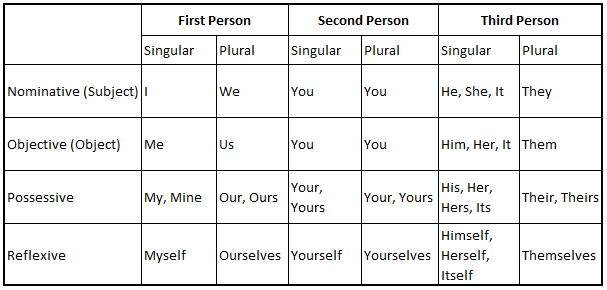The Forms of Personal Pronouns:

The pronoun it is used in following cases:
- For things without any life. Such as;[ Here is your book, take it away now.]
- For animals, unless there is a clear wish to speak of them as male or female. Such as; [He loves his dog and cannot do without it.]
- For a young child, unless we wish to clearly mention the gender. Such as; [ That baby has torn its clothes.]
- As a provisional and temporary subject before the verb to be when the real subject follows. Foe instance; [ It is easy to find fault. this can be rephrased as’ To find fault is easy’.]
- To refer to some statement going before. Such as; [ He is telling what is not right, and he knows it. ]
- To give emphasis to the noun or pronoun following. Such as; [ It was you who began the fight.]
- As an indefinite nominative of an impersonal verb. Such as; [ It rains, it snows, it thunders.]
- In speaking of the weather or the time. Such as; [ It is winter. It is ten o’clock. ]
Raman is a kind boy. He has lent his bicycle to Govind.
Savitri helps her mother in household work. She also does her lesson.
When two or more Singular Nouns are joined by and, the pronoun used for them must be plural. Such as;
Every soldier and every sailor was in his place.
When two or more Singular Nouns are joined by or’ or either’…or, neither…nor, the pronoun is generally Singular. Such as;
Jim or John must lend his hand.
Neither Anil nor Karim has done his lesson.
When a plural noun and a singular noun are joined are joined by ‘or’ or ‘nor’, the pronoun must be in the plural. Such as;
Either the dancer or his assistants failed in their duty.
A relative pronoun refers to a noun or
pronoun known as its antecendent, it can be same number and person as
its antecendent. We must remember here that the verb shows the number
and person of the relative pronoun. For instance;
I am the person that is to blame.
He that is not with me is against me.
This is the only one its poems that is worth reading.
To prevent ambiguity , the Relative Pronoun should be placed as near as possible its Antecedent.
Comments
Post a Comment